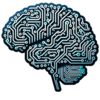| Part of a series on |
| Artificial intelligence |
|---|
Deepfakes (a portmanteau of 'deep learning' and 'fake'[1]) are images, videos, or audio which are edited or generated using artificial intelligence tools, and which may depict real or non-existent people. They are a type of synthetic media.[2]
While the act of creating fake content is not new, deepfakes uniquely leverage the technological tools and techniques of machine learning and artificial intelligence,[3][4][5] including facial recognition algorithms and artificial neural networks such as variational autoencoders (VAEs) and generative adversarial networks (GANs).[4][6] In turn the field of image forensics develops techniques to detect manipulated images.[7] Deepfakes have garnered widespread attention for their potential use in creating child sexual abuse material, celebrity pornographic videos, revenge porn, fake news, hoaxes, bullying, and financial fraud.[8][9][10][11]
Academics have raised concerns about the potential for deep fakes to be used to promote disinformation and hate speech, and interfere with elections. The information technology industry and governments have responded with recommendations to detect and limit their use.
From traditional entertainment to gaming, deepfake technology has evolved to be increasingly convincing[12] and available to the public, allowing for the disruption of the entertainment and media industries.[13]
- ^ Brandon, John (16 February 2018). "Terrifying high-tech porn: Creepy 'deepfake' videos are on the rise". Fox News. Archived from the original on 15 June 2018. Retrieved 20 February 2018.
- ^ Kalpokas, Ignas; Kalpokiene, Julija (2022). Deepfakes. Springer Cham. pp. 1–2. doi:10.1007/978-3-030-93802-4. ISBN 978-3-030-93801-7.
- ^ Juefei-Xu, Felix; Wang, Run; Huang, Yihao; Guo, Qing; Ma, Lei; Liu, Yang (1 July 2022). "Countering Malicious DeepFakes: Survey, Battleground, and Horizon". International Journal of Computer Vision. 130 (7): 1678–1734. doi:10.1007/s11263-022-01606-8. ISSN 1573-1405. PMC 9066404. PMID 35528632. Archived from the original on 10 June 2024. Retrieved 15 July 2023.
- ^ a b Kietzmann, J.; Lee, L. W.; McCarthy, I. P.; Kietzmann, T. C. (2020). "Deepfakes: Trick or treat?" (PDF). Business Horizons. 63 (2): 135–146. doi:10.1016/j.bushor.2019.11.006. S2CID 213818098. Archived (PDF) from the original on 29 December 2022. Retrieved 30 December 2022.
- ^ Waldrop, M. Mitchell (16 March 2020). "Synthetic media: The real trouble with deepfakes". Knowable Magazine. Annual Reviews. doi:10.1146/knowable-031320-1. Archived from the original on 19 November 2022. Retrieved 19 December 2022.
- ^ Schwartz, Oscar (12 November 2018). "You thought fake news was bad? Deep fakes are where truth goes to die". The Guardian. Archived from the original on 16 June 2019. Retrieved 14 November 2018.
- ^ Farid, Hany (15 September 2019). "Image Forensics". Annual Review of Vision Science. 5 (1): 549–573. doi:10.1146/annurev-vision-091718-014827. ISSN 2374-4642. PMID 31525144. S2CID 263558880. Archived from the original on 10 June 2024. Retrieved 20 September 2023.
- ^ Banks, Alec (20 February 2018). "What Are Deepfakes & Why the Future of Porn is Terrifying". Highsnobiety. Archived from the original on 14 July 2021. Retrieved 20 February 2018.
- ^ Christian, Jon. "Experts fear face swapping tech could start an international showdown". The Outline. Archived from the original on 16 January 2020. Retrieved 28 February 2018.
- ^ Roose, Kevin (4 March 2018). "Here Come the Fake Videos, Too". The New York Times. ISSN 0362-4331. Archived from the original on 18 June 2019. Retrieved 24 March 2018.
- ^ Schreyer, Marco; Sattarov, Timur; Reimer, Bernd; Borth, Damian (October 2019). "Adversarial Learning of Deepfakes in Accounting". arXiv:1910.03810 [cs.LG].
- ^ Caramancion, Kevin Matthe (21 April 2021). "The Demographic Profile Most at Risk of being Disinformed". 2021 IEEE International IOT, Electronics and Mechatronics Conference (IEMTRONICS). IEEE. pp. 1–7. doi:10.1109/iemtronics52119.2021.9422597. ISBN 978-1-6654-4067-7. S2CID 234499888. Archived from the original on 10 June 2024. Retrieved 9 June 2023.
- ^ Lalla, Vejay; Mitrani, Adine; Harned, Zach. "Artificial Intelligence: Deepfakes in the Entertainment Industry". World Intellectual Property Organization. Archived from the original on 8 November 2022. Retrieved 8 November 2022.
